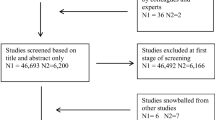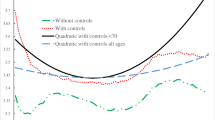Abstract
The evidence for any relationship between GDP/capita growth and growth in subjective wellbeing (SWB) in wealthier countries is disputed, at best. However, there are a number of reasons commonly articulated for thinking the relationship should be stronger in less developed countries (LDCs). This paper looks at both reasons for expecting the relationship to be stronger in developing countries, and those for a weak link that might still apply in LDCs. Finally, it turns to a limited data set to see what that might tell us. The results suggest that, at least in middle-income countries, there is little strong evidence in favor of a connection between economic growth and SWB.
Similar content being viewed by others
References
Ahuvia, A. and D. Friedman: 1998, ‘Income, consumption and subjective wellbeing’, Journal of Macromarketing (Fall).
R. Biswas-Diener E. Diener (2001) ArticleTitle‘Making the best of a bad situation: satisfaction in the slums of Calcutta’ Social Indicators Research 55 329–352 Occurrence Handle10.1023/A:1010905029386
H. Cantril (1965) The Pattern of Human Concerns Rutgers New Brunswick
E Cornish (1997) ArticleTitle‘Happiness and wealth’ The Futurist 31 IssueID5 S13–S15
E. Diener R. Biswas-Diener (2002) ArticleTitle‘Will money increase subjective wellbeing? A literature review and guide to needed research’ Social Indicators Research 57 119–169 Occurrence Handle10.1023/A:1014411319119
Ed. Deiner C. Diener (1995) ArticleTitle‘The wealth of nations revisited: income and the quality of life’ Social Indicators Research 36 275–286 Occurrence Handle10.1007/BF01078817
E. Diener S. Oishi (2000) ‘Money and happiness: income and subjective wellbeing across nations’ E. Diener E. Suh (Eds) Subjective Wellbeing Across Cultures MIT Press Cambridge, MA
J. Dusenberry (1949) Income, Saving and the Theory of Consumer Behaviour Harvard University Press Cambridge
R. Easterlin (1995) ArticleTitle‘Will raising the incomes of all increase the happiness of all?’ Journal of Economic Behaviour and Organization 27 35–47 Occurrence Handle10.1016/0167-2681(95)00003-B
R. Easterlin (1999) ArticleTitle‘How beneficent is the market? a look at the modern history of mortality’ European Review of Economic History December 3 3257–3294
W. Easterly (1997) ArticleTitle‘Life during growth’ Journal of Economic Growth 4 IssueID3 239–276 Occurrence Handle10.1023/A:1009882702130
A. Furnham M. Argyle (1998) The Psychology of Money Routledge London
B. Geremek (1997) Poverty: A History Blackwell Oxford
Graham, C. and S. Pettinato: 1999, ‘Assessing hardship and happiness: trends in mobility and expectations in the new market economies’, CSED Working Paper 7, Brookings Institution.
M. Hagerty R. Veenhoven (2003) ArticleTitle‘Wealth and happiness revisited: growing wealth of nations does go with greater happiness’ Social Indicators Research 64 1–27 Occurrence Handle10.1023/A:1024790530822
G. Ingram (1992) ‘Social indicators and productivity convergence in developing countries World Ban Policy’ World Bank Washington, DC
A. Kenny (1997) A Life in Oxford Blackwell Oxford
Kenny, C.: 1999, ‘Does growth cause happiness, or does happiness cause growth?’ Kyklos.
Kenny: 2004, ‘Why are we worried about income?’ Nearly everything that matters is converging, World Development, forthcoming.
A. Maddison (1995) Monitoring the World Economy 1890–1992 OECD Paris
B. Milanovic B. Jovanovic (1999) ArticleTitle‘Changes in the perception of the poverty line during times of depression: Russia 1993–6’ World Bank Economic Review 13 IssueID3 539–559
E. Mishan (1967) The Costs of Economic Growth Pelican London
D. Myers Ed. Diener (1996) ArticleTitle‘The pursuit of happiness’ Scientific American 272 IssueID5 70–72
D. Myers Ed. Diener (1997) ArticleTitle‘The science of happiness’ The Futurist 31 IssueID5 S1–S7
D. Narayan (1997) Voices of the Poor: Poverty and Social Capital in Tanzania, ESSD Studies and Monographs Series No. 20 The World Bank Washington DC
Pritchett Summers (1996) ArticleTitle‘Wealthier is healthier’ Journal of Human Resources 31 IssueID4 842–868
A. Pigou (1912) Wealth and Welfare Macmillan London
A. Sen (1980) ‘Equality of what?’ S. Mc Murrin (Eds) Tanner Lectures on Human Values i Cambridge University Press Cambridge
A. Sen (1985) The Standard of Living Cambridge University Press Cambridge
A. Sen (1992) Inequality Reexamined Harvard University Press Cambridge
A. Smith (1982) The Theory of Moral Sentiments (Glasgow edition) Liberty Press Indianapolis
A. Smith (1993) Wealth of Nations OUP Oxford
Tella, R., R. MacCulloch and A. Oswald: 1997, ‘The macroeconomics of happiness the labour market consequences of technical and structural change’, Discussion Paper Series No. 19, The Leverhulme Trust.
InstitutionalAuthorNameUNDP (1999) Human Development Report 1999 UN New York
T. Veblen (1987) The Theory of the Leisure Class Penguin New York
R. Veenhoven (1994) ArticleTitle‘Is happiness a trait?’ Social Indicators Research 32 101–160 Occurrence Handle10.1007/BF01078732
Veenhoven, R.: 1999, ‘World Database of Happiness’, http://www/eur.nl/fsw/research/happiness.
InstitutionalAuthorNameWorld Bank (1999a) ‘Tanzania: peri-urban development in the African Mirror’ World Bank Washington, DC
InstitutionalAuthorNameWorld Bank (1999b) World Development Indicators World Bank Washington, DC
InstitutionalAuthorNameWorld Bank (1996) From Plan to Market: World Development Report 1996 Oxford University Press New York
Author information
Authors and Affiliations
Corresponding author
Additional information
Thanks to commentators including R. Cummins, R. Veenhoven and J. Bernheim and A. Kenny as well as participants at a World Bank seminar and an anonymous reviewer for their comments on earlier drafts. The paper reflects the opinions of the author, not necessarily those of the World Bank or its executive directors.
Rights and permissions
About this article
Cite this article
Kenny, C. Does Development Make You Happy? Subjective Wellbeing And Economic Growth In Developing Countries. Soc Indic Res 73, 199–219 (2005). https://doi.org/10.1007/s11205-004-0986-4
Accepted:
Issue Date:
DOI: https://doi.org/10.1007/s11205-004-0986-4




